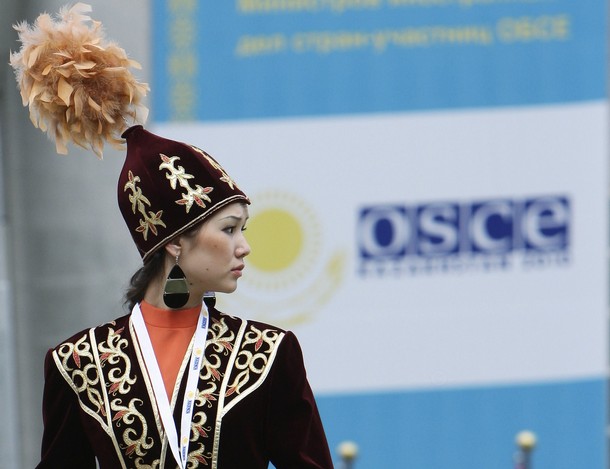
Last week’s informal ministerial meeting of the OSCE in Almaty, Kazakhstan resulted in two important decisions. First, the OSCE agreed to send 52 police officers to Kyrgyzstan to assist and monitor the local authorities in the aftermath of June’s interethnic violence in the south. Second, ministers agreed to convene a summit of heads of state and government in fall 2010.
These are both noteworthy achievements and diplomatic victories for Kazakhstan as OSCE Chairman-in-Office. Nonetheless, they are only modest first steps. The ministerial left important questions unanswered, the outcome of which will play an important part in determining the OSCE’s future in the broader Eurasian region:
- First, will the modest OSCE contribution in Kyrgyzstan be sufficient to maintain peace and stability in that fragile country?
- Second, will President Obama represent the United States at the summit and, if not, what impact will his absence have on the level and substance of the summit?
- And third, will Kazakhstan ‘declare victory’ having secured a summit, or will it continue efforts to make progress on meeting its Madrid commitments on democracy, human rights, and media freedoms, and also press for substantive summit outcomes?
Kyrgyzstan: A Modest OSCE Deliverable
The most important deliverable from the OSCE summit is the agreement with Kyrgyzstan to send a Police Advisory Group from the OSCE member states. These officers will stay in Kyrgyzstan for at least four months and will probably be unarmed. OSCE Conflict Prevention Centre Director Herbert Salber described their mission and mandate in further detail:
The task of this mission is [sic] first of all advising the Kyrgyz police. The Police Advisory Group will have contact with all parts of the population in southern Kyrgyzstan. They will be assisting and also monitoring the Kyrgyz police. They will accompany them in their work with the communities there with the objective of strengthening the confidence in this area, in particular between the police and the population.
If necessary, and contingent on continued political consensus, the mission could be further extended, and up to 50 additional officers could be added to the effort at a later stage. Even this small force is politically controversial, however, and has already sparked some small protests in Osh, Kyrgyzstan.
While the agreement on the police advisory mission is an important step for the OSCE, the ministerial decision is a relatively modest outcome. It remains uncertain whether this step will be enough to prevent future outbreaks of violence. The OSCE must remain active in the months to come to ensure that the current fragile peace develops into longer-term stability. As proposed in the Atlantic Council’s June issue brief “Uncertain Kyrgyzstan: Rebalancing U.S. Policy,” Kazakhstan should call for an independent investigation by ODHIR into the cause of last month’s interethnic violence to help facilitate the reconciliation process in Kyrgyzstan.
What Kind of Summit?
One of Kazakhstan’s major foreign policy priorities has been to secure an OSCE summit under its chairmanship in 2010. Despite the fact that the OSCE has not held a summit since the 1999 meeting in Istanbul, a number of countries – including the United States – initially failed to see a compelling case to host a summit in 2010, due to a lack of clearly identifiable substantive agenda items or concerns about Kazakhstan’s inconsistent human rights record.
Ultimately, the Kazakhs emerged from the ministerial with an important diplomatic victory. All OSCE members agreed to participate in a summit, which will likely take place in Astana this fall. According to Kazakhstan’s Foreign Minister and present OSCE Chairperson-in-Office Kanat Saudabayev, the tentative agenda for the Summit will include, “shaping a united and indivisible security space, free of dividing lines and different levels of security,” as well as strengthening the OSCE and its ability to prevent or resolve conflicts in Europe and Eurasia.
Important questions remain, both for the United States and Kazakhstan, in determining the ultimate success of the summit. First, the United States failed to commit President Obama to participate in the summit. Absence of the American President could offend the host and signal that the OSCE is not a priority to the administration. This would badly weaken the position of the United States in Central Asia and within the OSCE.
Despite Minister Saudabayev’s listing of agenda items for the summit, important legwork will need to done at the OSCE Permanent Council between now and the summit to ensure that the summit is substantive and produces tangible improvements to European and Eurasian security. “Behind the Eight Ball: Deciding on an OSCE Summit” outlines a possible substantive agenda. Furthermore, the meeting between Minister Saudabayev and Afghan President Hamid Karzai at the Kabul International Conference earlier this week on the OSCE’s role in Afghanistan is a positive sign of Astana’s continued determination to remain substantively engaged as Chairman-in-Office in the most important security concerns in its neighborhood. A renewed push for an OSCE supporting role on Afghanistan and an even more robust OSCE-led mission in Kyrgyzstan would further demonstrate the importance of serious American representation at the summit and the relevance of the OSCE.
President Nazarbayev and Minister Saudabayev deserve credit for leading the OSCE into agreeing to a summit, but important work remains to be done to ensure that Kazakhstan’s Chairmanship produces a legacy of substance and progress. Their ability to do so will in part be a reflection of Kazakhstan’s ability to continue to make important strides in meeting the Madrid commitments it agreed to on democracy, media freedom, and human rights between now and the summit.
Jeff Lightfoot is associate director of the Atlantic Council’s International Security program. Matt Czekaj is a research associate with the International Security program. Photo credit: Reuters Pictures.
Image: Kazakh%20OSCE.jpg
